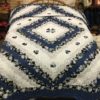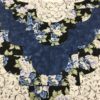



$679.00
Measures 98″ wide x 112″ long
The Hearts All Around quilt is a graceful pattern with hand-appliqued hearts. The 170 yards of hand-quilting is all done by one Pennsylvania Amish woman to insure uniform stitching. The Hearts All Around quilt with a scarlet scalloped border is initialed and dated. On a queen-size bed, this quilt will have approximately 19 inches of drop per side.
Homemade quilts combine the warmth of a bed cover with a unique story told by the quilters from Lancaster County, PA. Every homemade quilt is as unique as the family, busy mother or Amish ladies group who uses a needle and thimble to thread stitch on the quilt. Some quilts involve hundreds of hours and thousands of stitches to create a unique patchwork quilt that will last for generations.
When you peruse our HOMEMADE QUILTS you are shopping for an item that tells a story and adds meaning to your bedroom! Discover more about our unique patchwork quilts and the stories behind them…
We have a lot of quilts! Want to see a gallery of the major patterns? Checkout our Common Amish Quilt Patterns.
Had you lived three centuries ago, you probably would not have owned an applique quilt unless you were very wealthy. These quilts are typically made with one large piece of fabric and decorated with time-consuming patterns, each of which must be stitched individually. Only the rich could afford the fabric and spare the free time for such a project.
As the Industrial Revolution slashed the costs of fabric in the 1800s, applique quilts became more popular among middle-class American women. Traditionally, young girls were supposed to make thirteen (a “baker’s dozen”) quilt tops before engagement, and then her family and friends might pitch in to help her finish them before the wedding. Twelve of these quilts were often pieced, made for anyone in her new household to use.
One “masterpiece” quilt, though, was reserved for the bridal bed, and young women would lavish their time and creativity on its design. Applique quilts were very popular for these special coverlets, with baskets of roses and wreaths of flowers rioting across their center and borders.
Another American tradition is the folk art quilt, which was often filled with plants, animals, people, or even words, all telling a story. Some even preserve history that may never have been recorded otherwise, as with Harriet Powers’ quilts. She knew slavery and racism, born in Georgia in 1837, but she used her needle to speak to a society that didn’t want to hear her voice. The Smithsonian displays her Bible quilt and the Museum of Fine Arts in Boston displays her pictorial quilt, both of them preserving her bold and artistic storytelling.